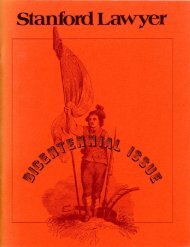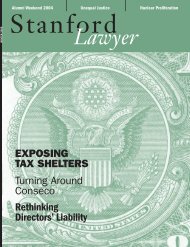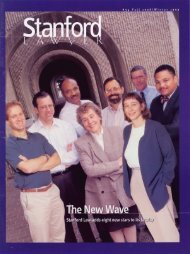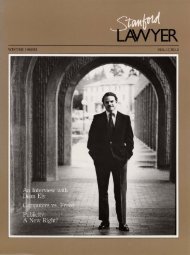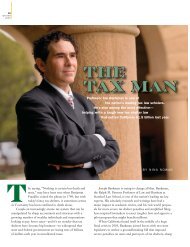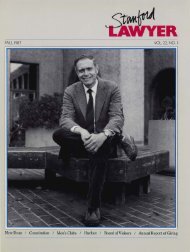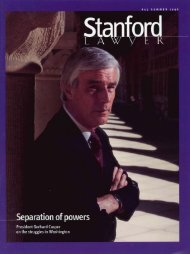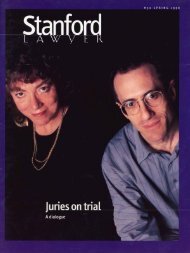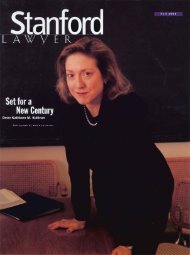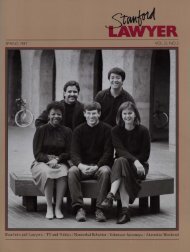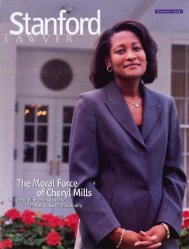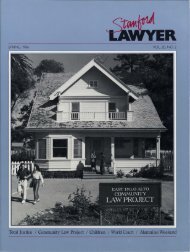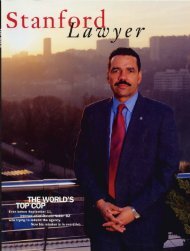Issue 73 - Stanford Lawyer - Stanford University
Issue 73 - Stanford Lawyer - Stanford University
Issue 73 - Stanford Lawyer - Stanford University
You also want an ePaper? Increase the reach of your titles
YUMPU automatically turns print PDFs into web optimized ePapers that Google loves.
CHANGING THE WORLD<br />
25<br />
STANFORD<br />
LAWYER<br />
In her work on asbestos litigation,<br />
Deborah R. Hensler,<br />
Judge John W. Ford Professor of<br />
Dispute Resolution, says she often<br />
hears the question, “Asbestos<br />
Isn’t that in the past”<br />
Quite the contrary: because asbestos-related diseases<br />
have a latency period of up to 40 years, the injuries—and<br />
the lawsuits—have multiplied in recent years.<br />
And because asbestos lined the pipes and ceilings of<br />
so many buildings throughout the United States, and<br />
was used in myriad products, Hensler said, “There’s an<br />
almost unlimited number of business entities that had<br />
some responsibility for workers’ exposure.”<br />
So Hensler’s work on a RAND Corporation study<br />
released May 10 of this year, “Asbestos Litigation,” is<br />
only too timely. Hensler joined the law school faculty<br />
in 1998 from RAND, where she was director of the<br />
Institute for Civil Justice, the pre-eminent center for<br />
non-advocacy research on civil justice policy.<br />
The most disturbing findings of the report,<br />
Hensler says, are that people with minor or no injuries<br />
are now filing the majority of the lawsuits, and more<br />
than half the money spent is going to lawyers and<br />
legal expenses.<br />
“There are lots of people who have X-rays that<br />
show damage but have no symptoms,” Hensler said.<br />
“My hope is that through congressional or other<br />
PHOTO: LINLY HARRIS<br />
DEBORAH HENSLER: REFORMING ASBESTOS LITIGATION<br />
action, the system will be reformed so that more of the<br />
money will go to the people who’ve been most seriously<br />
injured.”<br />
In the RAND report, Hensler and her co-authors<br />
discuss recent proposals for reforming the asbestos<br />
compensation system, including using medical criteria<br />
to screen tort claims, and removing asbestos litigation<br />
from the tort system entirely, substituting a trust fund<br />
for asbestos victims.<br />
This spring, the U.S. Senate voted legislation that<br />
would establish a trust fund—SB 852—out of committee.<br />
But whether it will make it into law is still unclear;<br />
asbestos litigation reform has been proposed many<br />
times before, only to fail.<br />
“Deborah is the neutral party who tries to provide<br />
objective information to the policymakers so they can<br />
sort out their issues,” said Stephen Carroll, a senior<br />
economist at RAND. “She is very concerned about<br />
fairness and equity, and a part of her concern is to alert<br />
policymakers that the court system does not handle<br />
mass litigation well.”<br />
Hensler, who has been studying asbestos litigation<br />
since the 1980s, said that the subject never fails<br />
to interest her. “Asbestos litigation provides a prism<br />
through which to view the strengths and weaknesses<br />
of the tort system,” she said. “Whenever I think there<br />
is nothing further to learn from the asbestos saga, I<br />
am proved wrong.”—Mandy Erickson<br />
PAMELA KARLAN: EXTENDING VOTING RIGHTS<br />
The Mississippi and Arkansas<br />
Deltas share similar history<br />
and demographics. But there is a<br />
subtle difference. In Mississippi,<br />
on the eastern bank of the<br />
Mississippi River, the local government<br />
must receive federal approval before it makes<br />
any changes to registration requirement, voting procedures,<br />
or electoral districts. In Arkansas, on the western<br />
bank, “preclearance” doesn’t apply. As a result, said<br />
Pamela S. Karlan, “If you look at Mississippi, the black<br />
community there has been much more successful at<br />
electing representatives of its choice than comparable<br />
communities in the Arkansas Delta.”<br />
PHOTO: LINDA A. CICERO<br />
The preliminary research, which Karlan compiled<br />
with student help, is just one piece of evidence the<br />
Kenneth and Harle Montgomery Professor of Public<br />
Interest Law hopes to use this fall as part of a concerted<br />
effort to reauthorize the Voting Rights Act. Passed<br />
in 1965 at the height of the civil rights movement,<br />
the groundbreaking federal legislation permanently<br />
outlawed such practices as poll taxes and literacy tests<br />
that were designed to prevent African-Americans from<br />
voting.<br />
But the act also included some temporary provisions<br />
that will expire in 2007 unless Congress acts.<br />
Among them is Section 5, which requires that certain<br />
states and counties receive preclearance from the feder-




